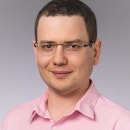- Speaker
-
 Mark Braverman, Ph.D.Professor, Department of Computer Science, Princeton University
Mark Braverman, Ph.D.Professor, Department of Computer Science, Princeton University
Presidential Lectures are a series of free public colloquia spotlighting groundbreaking research across four themes: neuroscience and autism science, physics, biology, and mathematics and computer science. These curated, high-level scientific talks feature leading scientists and mathematicians and are designed to foster discussion and drive discovery within the New York City research community. We invite those interested in these topics to join us for this weekly lecture series.
A shape can tile space if we can take infinitely many copies of the shape and shift them around to cover every point without overlapping. For example, squares and hexagons can tile a plane, but circles can’t. Questions linger, though. What is the smallest surface area a tile may have? Does the answer change if we require the tiles to be symmetric?
In this lecture, Mark Braverman will discuss the question of minimizing the surface area of tiles, a problem that dates back to the 19th century. The question turns out to have surprising connections to computational complexity theory in the context of combining computationally difficult problems to make them even harder. Braverman will elucidate these connections and present results on the minimum surface area problem.
